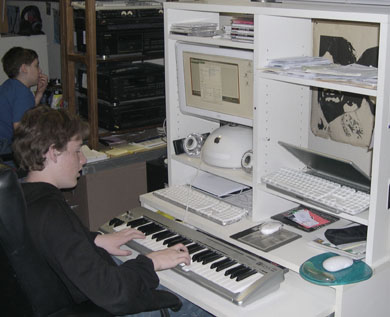Conditionals
(Adapted from Esteras, Remacha Santiago. C. U. P., 2002)
A. Read the texts and match them with the headings in the box.
|
|
Multimedia Magic 1. Multimedia applications are used in
all sorts of fields. Fore example, some museums, banks and estate agents
have information kiosks that use multimedia. Companies produce training
programs on optical disks, and marketing managers use presentation packages
(e.g. Microsoft PowerPoint) to make business presentations. Teachers
use multimedia programs to make video projects or to teach subjects
such as music and languages. They have all found that moving images,
sound and music involve viewers emotionally as well as inform them,
and make their message more memorable.
You can also listen to music on your
PC. Many radio stations broadcast on the Web using a technique called
‘streaming’. This lets you play an audio file in a continuous
stream, while it’s downloading, before the entire file is transmitted.
Sometimes bands transmit concerts on the Web in a process called ‘webcast’
(to use the Internet to broadcast live or delayed audio and/or video
transmissions). To listen to online music you just need a plug-in like
RealPlayer. 3.
|
B. Read the texts again and correct
these statements. There is a technical mistake in each of them.
1. Multimedia PCs cannot integrate text with graphics and video.
2. You don’t need to have a sound board on your PC to hear speech and
music.
3. Most multimedia software is distributed on magnetic disks.
4. Digital cameras store photos in a roll of film.
5. There are no language courses available on CD-ROM.
C. Match these terms in the box with
the explanations.
| a. hypertext b. MIDI interface
c.Video editing |
1. The process of manipulating video images.
2. A code for the exchange of information between PCs and musical instruments.
3. Text with hyperlinks, which take you to other pages.
4. A concert or other event that is transmitted over the Web.
5. A technique for playing sound and video files as a continuous stream, while
they’re downloading.
D. Grammar Focus
| CONDITIONAL CLAUSES
1. First Conditional (possible situation): If A happens B
will happen e.g. If you click on the speaker icon, you’ll get a piece of dialogue from the movie. a. When the verb to be is used in the main clause, the base form be is used after will. e.g. If you hire a fast Internet provider, your phone bills will be lower. b. The negative form of will is won’t (will + not). c. In the main clause, we can also have a modal (can, may), an imperative, or a present tense verb. 2. Second Conditional (unlikely situation):
If A happened B
would happen If I had money, I would (I’d) invest in a multimedia upgrade kit. a. Attention: when used in the if-clause, the verb be
becomes were for all persons. b. When the verb to be is used in the main clause, the
base form be is used after would. Other modals (could, should, might) may appear in the
main clause. Note: You need to learn some past tense forms of the verbs to use the second conditional correctly. |
On-line Practice. Go to: http://web2.uvcs.uvic.ca/courses/elc/studyzone/330/grammar/1cond.htm and read more about the First Conditional. Then, answer the exercises.
Now, Go to: http://web2.uvcs.uvic.ca/elc/studyzone/410/grammar/2cond.htm and practice the Second Conditional.
E. Exercise: Conditionals
Read these sentences and identify the tenses used in the if-clause and in the main clause.
a. If you upgrade your PC, you’ll be
able to run multimedia applications.
b. If the marketing manager had a multimedia system, she could make more effective
presentations.
c. If you buy a new PC, your old problems will disappear.
F. Put the verbs in brackets into
the correct form.
a. If I (get)
a sound card, I’ll be able to create my own music with a MIDI.
b. If the system (have)
a SuperVGA card, we would obtain a better a resolution.
c. You won’t be able to play CD-ROM disks if you (not have)
a CD-ROM drive.
d. If you (come)
to the annual computer exhibition, you could see the new Macs.
e. If I could afford it, I (buy)
a Multimedia PC.
